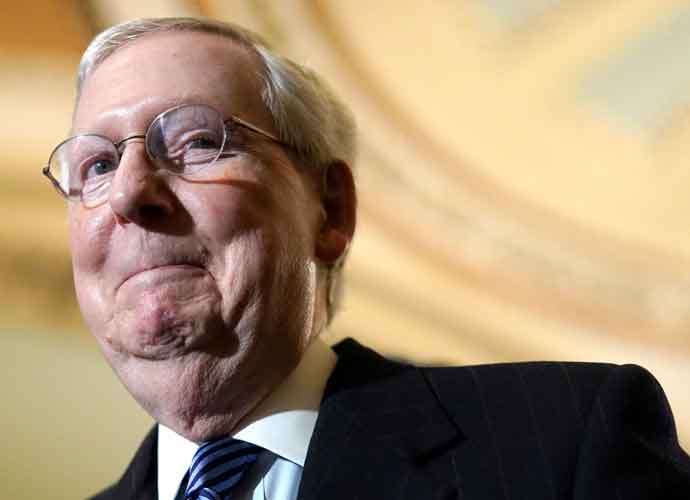McConnell Vows To Bring Trump’s Supreme Court Pick For Senate Floor Vote
Senate Majority Leader Mitch McConnell (R-Kentucky) promised to bring President Donald Trump‘s Supreme Court appointee to the Senate floor for a vote after the passing of liberal justice Ruth Bader Ginsburg.
“President Trump’s nominee will receive a vote on the floor of the United States Senate,” McConnell said in a statement Friday night.
Ginsburg passed away at the age of 87 from complications related to pancreatic cancer, setting up the stage for a fierce political fight just weeks before the election.
Democrats have urged McConnell to wait until January, for whomever the next president would be to make their appointment.
Subscribe to our free weekly newsletter!
A week of political news in your in-box.
We find the news you need to know, so you don't have to.
Senate Minority Leader Chuck Schumer (D-New York) tweeted that “this vacancy should not be filled until we have a new president.”
The American people should have a voice in the selection of their next Supreme Court Justice. Therefore, this vacancy should not be filled until we have a new president.
— Chuck Schumer (@SenSchumer) September 18, 2020
“The American people should have a voice in the selection of their next Supreme Court Justice,” Schumer wrote. “Therefore, this vacancy should not be filled until we have a new president.”
Sen. Dianne Feinstein (D-California) similarly called on Congress to wait.
“Now is not the time for a partisan battle over the next nomination for the Supreme Court,” Feinstein said. “People have already begun to vote. It’s clear that the next president must nominate a future justice and the next Congress must consider that nominee.”
However, McConnell is unlikely to waver in his commitment to vote on one of Trump’s proposed appointees. When Justice Antonin Scalia died in February 2016, the Republican leader argued that the choice should be left to voters ahead of the election, blocking former President Barack Obama‘s pick of Merrick Garland.
Later, he changed Senate’s filibuster rules to place two conservative Trump picks on the court, Justices Neil Gorsuch and controversial Brett Kavanaugh.
Sen. Ed Markey (D-Massachusetts) blasted McConnell in a tweet for indicating that he wouldn’t follow the precedent he set in 2016.
“Mitch McConnell set the precedent,” Markey said. “No Supreme Court vacancies filled in an election year. If he violates it, when Democrats control the Senate in the next Congress, we must abolish the filibuster and expand the Supreme Court.”
Mitch McConnell set the precedent. No Supreme Court vacancies filled in an election year. If he violates it, when Democrats control the Senate in the next Congress, we must abolish the filibuster and expand the Supreme Court.
— Ed Markey (@EdMarkey) September 19, 2020
While Kavanaugh’s confirmation was mired with allegations of sexual assault, and the focus was centered on a handful of moderate Republicans, that the same group is likely to face even more scrutiny this round of votes, in the lead-up up to the election.
Sen. Susan Collins (R-Maine, who was often considered one of the swing votes for Kavanaugh, told The New York Times recently that she would not support confirming a Supreme Court Justice in October, due to the nearing election.
And just before Ginsburg’s passing was announced, Sen. Lisa Murkowski (R-Alaska) told Alaska Public Radio that the timing for a Supreme Court confirmation is wrong.
“I would not vote to confirm a Supreme Court nominee. We are some 50 days away from an election,” Murkowski said.
Other vulnerable Republicans who may be forced to answer questions about the confirmation include Sens. Thom Tillis (R-North Carolina) and Cory Gardner (R-Colorado), as well as Senate Judiciary Committee Chairman Lindsey Graham (R-South Carolina), the latter of which has been a consistent supporter of both Trump and McConnell but faces a tough reelection fight of his own.
On Friday, Graham made no mention of the political battle about to begin and offered only condolences to Ginsburg’s family.
“It was with great sadness that I learned of the passing of Justice Ginsburg,” said Graham. “Justice Ginsburg was a trailblazer who possessed tremendous passion for her causes. She served with honor and distinction as a member of the Supreme Court. While I had many differences with her on legal philosophy, I appreciate her service to our nation.”
In 2018, Graham said he would “wait until the next election” if there was vacancy in the final year of Trump’s presidency, but has since wavered in the wake of the Kavanaugh hearings. However, due to his record of siding with the administration and McConnell, it is unlikely Graham would be in favor of postponing the confirmation.
Sen. Ted Cruz (R-Texas) voiced his concerns over holding off on confirming a new justice.
“We cannot have Election Day come and go with a 4-4 court… and I think we risk a constitutional crisis if we do not have a nine-justice Supreme Court, particularly when there is such a risk of a contested litigation and a contested election,” Cruz told Fox News Friday.
CNN’s Jake Tapper contradicted Cruz’s claim, tweeting a reminder than an 8-justice Supreme Court existed during the 2016 presidential election, ahead of Gorsuch’s confirmation.
Prepare to hear much concern voiced about the risks of an 8-justice Supreme Court existing during the 2020 presidential election that was not voiced during the 8-justice Supreme Court that existed during the 2016 presidential election. https://t.co/KJbq8L0dok
— Jake Tapper (@jaketapper) September 19, 2020
“Prepare to hear much concern voiced about the risks of an 8-justice Supreme Court existing during the 2020 presidential election that was not voiced during the 8-justice Supreme Court that existed during the 2016 presidential election,” Tapper wrote.
Republicans currently hold 53 seats in the Senate. In the event that the confirmation process occurs ahead of the election, four Republicans would have to flip. If only three flip, the Senate could face a 50-50 tie, which would be broken by Vice President Mike Pence.
Get the most-revealing celebrity conversations with the uInterview podcast!








Leave a comment